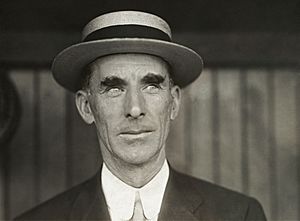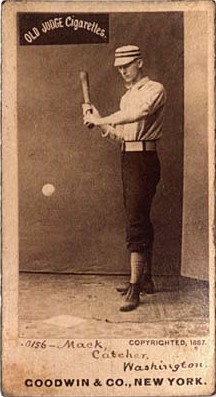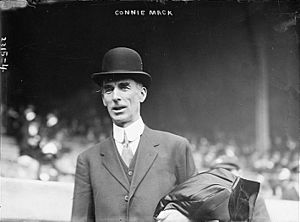Connie Mack facts for kids
Quick facts for kids Connie Mack |
|||
|---|---|---|---|
 |
|||
| Catcher / Manager / Owner | |||
| Born: December 22, 1862 East Brookfield, Massachusetts, U.S. |
|||
| Died: February 8, 1956 (aged 93) Philadelphia, Pennsylvania, U.S. |
|||
|
|||
| debut | |||
| September 11, 1886, for the Washington Nationals | |||
| Last appearance | |||
| August 29, 1896, for the Pittsburgh Pirates | |||
| MLB statistics | |||
| Batting average | .245 | ||
| Home runs | 5 | ||
| Runs batted in | 265 | ||
| Games managed | 7,755 | ||
| Managerial record | 3,731–3,948 | ||
| Winning % | .486% | ||
| Teams | |||
As player
As manager
|
|||
| Career highlights and awards | |||
|
|||
| Induction | 1937 | ||
| Election Method | Veterans Committee | ||
Cornelius McGillicuddy (December 22, 1862 – February 8, 1956), known as Connie Mack, was an American professional baseball catcher, manager, and team owner. He managed in Major League Baseball for a very long time. In fact, he holds records for the most wins (3,731), losses (3,948), and games managed (7,755). His win total is 829 more than the next highest manager, Tony La Russa.
Mack managed the Philadelphia Athletics for 50 seasons, starting in 1901. He retired at age 87 after the 1950 season. He was also a part-owner of the team from 1901 to 1954. He was the first manager in the American League to lead a team to 100 wins in a season, which he did five times. He won the World Series five times, which is the third most by any manager. He also won nine American League championships. However, his teams sometimes struggled financially, which meant he often had to rebuild his team. His teams finished in last place 17 times. Connie Mack was voted into the National Baseball Hall of Fame in 1937.
Contents
Early Life and Baseball Beginnings
Connie Mack was born Cornelius McGillicuddy on December 22, 1862, in East Brookfield, Massachusetts. His parents, Michael McGillicuddy and Mary McKillop, were immigrants from Ireland. The family often used the nickname "Mack" for their last name. Cornelius was called "Connie Mack" from a young age. He was very tall and thin, which earned him the nickname "Slats" on the baseball field.
His father worked as a wheel maker. Connie started working in cotton mills at age 9 to help his family. He left school after eighth grade at age 14 to work full-time. He worked in stores, on farms, and in shoe factories.
Connie was also a talented athlete. He loved playing baseball with friends in East Brookfield. By 1879, when he was just 16, he joined his town's baseball team. Even though he was younger, he was the team's catcher and leader.
Playing Career Highlights
Connie Mack played in the major leagues for 11 seasons, mostly as a catcher. He started in 1886 with the Washington Nationals. He later played for the Buffalo Bisons and the Pittsburgh Pirates.
As a player, Mack was known for being very smart, even if he wasn't a powerful hitter. He was one of the first catchers to stand right behind home plate. He was also known for trying to distract batters with clever talk. He even developed tricks like faking the sound of a foul tip. He was also good at "tipping" bats, which meant brushing the batter's bat with his mitt to mess up their swing. Mack never denied using these clever tactics.
Connie Mack: The Manager
Connie Mack's last three seasons as a player were also spent as a player-manager for the Pittsburgh Pirates. After that, he managed a minor league team, the Milwaukee Brewers, for four seasons. In 1901, Mack became the manager and part-owner of the new American League team, the Philadelphia Athletics.
He managed the Athletics for 50 years, until 1950, when he was 87 years old. This is the longest time anyone has managed a team in North American professional sports. During his time, the Athletics won nine league championships and five World Series titles.
Mack was often called "the Tall Tactician" because he was very smart and innovative as a manager. He looked for intelligent players who were self-motivated and disciplined. He believed that smart players made the best teams. Many of his players went on to become successful college coaches themselves.
Mack had a special "Code of Conduct" for his players. It encouraged them to always play their best, be good sports, follow the rules, and work for the team. He wanted his players to be good people on and off the field. He also preferred players who lived quiet, disciplined lives.
His managing style was relaxed. He trusted his players and didn't set strict rules like curfews. He was good at finding talented players, teaching them, and then letting them play their game. He was also one of the first managers to move his fielders around during a game. He would wave his rolled-up scorecard from the dugout to tell his outfielders where to stand.
Three Great Teams
Over his long career, Mack built three amazing teams, sometimes called "dynasties."
His first great team, with players like Rube Waddell and Eddie Plank, won the league championship in 1902 and 1905. In the 1905 World Series, they lost to the New York Giants. The Giants' manager, John McGraw, once said Mack had "a big white elephant on his hands" with the Athletics. Mack proudly made the white elephant the team's logo, which the Athletics still use today.
As his first team got older, Mack found new young players to build his second great team. This team had the famous "$100,000 infield" with stars like Eddie Collins and Home Run Baker. These Athletics won the league championship in 1910, 1911, 1913, and 1914. They won the World Series in 1910, 1911, and 1913.
After this team broke up due to money problems, Mack built his third great team in the 1920s. This team included future Hall of Fame players like Mickey Cochrane, Lefty Grove, and Jimmie Foxx. They won the league championship in 1929, 1930, and 1931, winning the World Series in 1929 and 1930.
Later Years as Manager
After 1932, Mack faced financial challenges again and had to sell many of his best players. His teams struggled for many years, often finishing in last place. As he got older, his health declined, and his mind wasn't as sharp. His coaches and players often helped him run the team during games.
Despite these challenges, Mack led the team to a few winning seasons in the late 1940s. In 1950, his 50th year as manager, his sons convinced him to let his coaches take over more of the day-to-day managing. Mack officially retired as manager at the end of that season.
Connie Mack: The Owner
Connie Mack was not just a manager; he was also a team owner. He helped start the Philadelphia Athletics and eventually became the majority owner. He had a great network of friends in baseball who helped him find talented players. Mack saw baseball as a business and understood the financial side of running a team.
He faced many money problems throughout his career. This often forced him to sell his best players, even after winning championships. For example, after World War I, his team struggled greatly, finishing last for seven years in a row. The 1916 team, with only 36 wins and 117 losses, is considered one of the worst teams in baseball history.
During the Great Depression in 1929, Mack again had to sell star players like Lefty Grove and Jimmie Foxx to keep the team going. Even though he wanted to build more championship teams, he couldn't due to a lack of money.
In the 1940s, Mack gave parts of the team to his three sons. However, his sons often disagreed, which created more problems for the team. Eventually, the team faced bankruptcy. In 1954, Mack agreed to sell the Athletics to a new owner, and the team moved to Kansas City. This was a very sad moment for Mack, as his team was leaving Philadelphia after 55 years.
Personality and Legacy
Connie Mack was known for being quiet, calm, and a true gentleman. He never used bad language and was always respectful. Players called him "Mr. Mack," and he always called his players by their first names. Many people saw him as a kind and wise figure in baseball.
Some newspaper writers criticized him for not spending enough money on players. However, his biographer says that Mack's financial decisions were necessary to keep the team alive. Mack himself was upset by these claims. He once gave his players the team's share of ticket sales from a World Series game to prove he wasn't trying to make extra money by extending the series.
Mack was very supportive of his family and helped former players who needed jobs. He kept many of them on the team payroll as scouts or coaches.
Connie Mack lived through a time when baseball was segregated, meaning only white players were allowed in the major leagues. His team did not have a black player until 1953, three years after he retired.
The Philadelphia stadium where the Athletics played was renamed Connie Mack Stadium in 1953 in his honor. It was home to the Athletics and later the Phillies. Mack passed away on February 8, 1956, at the age of 93. He is remembered as one of baseball's most important figures.
Images for kids
-
Senators' manager Bucky Harris and Mack, Opening Day, April 13, 1926.
Family Life
Connie Mack married Margaret Hogan in 1887. They had three children: Earle, Roy, and Marguerite. Margaret passed away in 1892.
In 1910, Mack married Catherine Holahan. They had four daughters and a son, Cornelius Jr. Mack was a lifelong Catholic and a member of the Knights of Columbus.
His son, Earle Mack, played a few games for the Athletics and even managed the team when his father was ill. Connie Mack's descendants have also been involved in politics. His grandson, Connie Mack III, and great-grandson, Connie Mack IV, both served in the U.S. House of Representatives.
See also
- Major League Baseball all-time managerial wins
- List of Major League Baseball player–managers
- Connie Mack Stadium (Shibe Park)
 | Isaac Myers |
 | D. Hamilton Jackson |
 | A. Philip Randolph |












